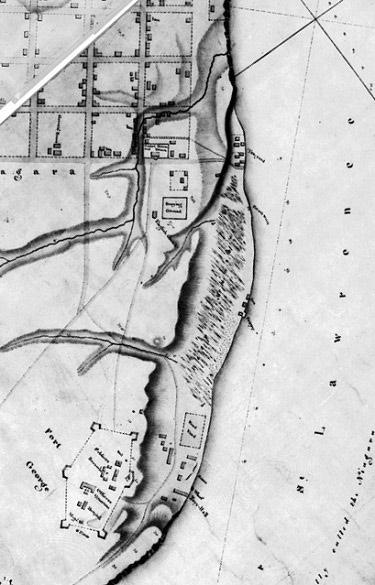In December 1813, Elizabeth Campbell lost everything she owned when American troops burned her house and the entire town of Niagara. Residents on both sides of the Niagara River became refugees when invaders burned their way through the region.
"Exposed for three days & nights upon the snow" a neighbor describes Elizabeth Campbell’s trials after troops burned her out of her house.

Library and Archives Canada
The ravages of war rarely spare civilians and onlookers. In the halls of power, the struggle might seem to be about political issues like free trade and impressment. But to the noncombatants caught in the path of the fighting, the war was far more urgent, personal, and cruel. Many learned firsthand the bitter lesson that the devastations of the war would not be confined simply to soldiers on the battlefields, whether they cared about the political issues or not.
Mrs. Elizabeth Campbell, the widow of a British officer, was one such noncombatant caught in the grip of war. During the evacuation of Niagara in December 1813, Elizabeth and her four children were forced from their home to stand in the snow as retreating American troops burned the town. An acquaintance later described her miserable plight, “driven from her house with her Infants without the propriety of saving even her own or their Clothes, and …exposed for three days & nights upon the snow with the Canopy of Heaven for a covering.”
Campbell survived the icy ordeal, but the family lost their house, a stable, other outbuildings, and fences. They also lost all their possessions, including beds, tables, chairs, and clothes. One account says that Elizabeth travelled with her children, Edward, John, Eleanor and Libby, to the nearest settlement. In the end, “she had carried her infant four miles for baptism, and afterwards had to dig its grave and cover its remains.”
Over a year later, in February 1814, Elizabeth received a ration of candles and fuel from the army commissary. In March 1814, she submitted a claim for war losses to the British authorities. Over the next nine years, evidence of her claim and statements from respected members of the town would determine whether she should receive the amount claimed. In 1823, a local lawyer testified that the Campbell’s house was “furnished in a style corresponding with the rank of her husband” and that the “property was totally destroyed by fire by the American Army in 1813.”
At least one hundred residents of Niagara submitted claims for property and possessions lost in the fire of December 10, 1813. In June 1815, Elizabeth, now living in New Brunswick, learned that she could receive a portion of her claim, just over £63, from the funds set aside for the victims of Niagara. Eventually, Elizabeth Campbell’s family would receive £570 pounds in repayment—just 70 per cent of her claim. In all, eight hundred residents of the Niagara region received compensation for their losses, but little remained of their former lives.
Last updated: March 6, 2015
